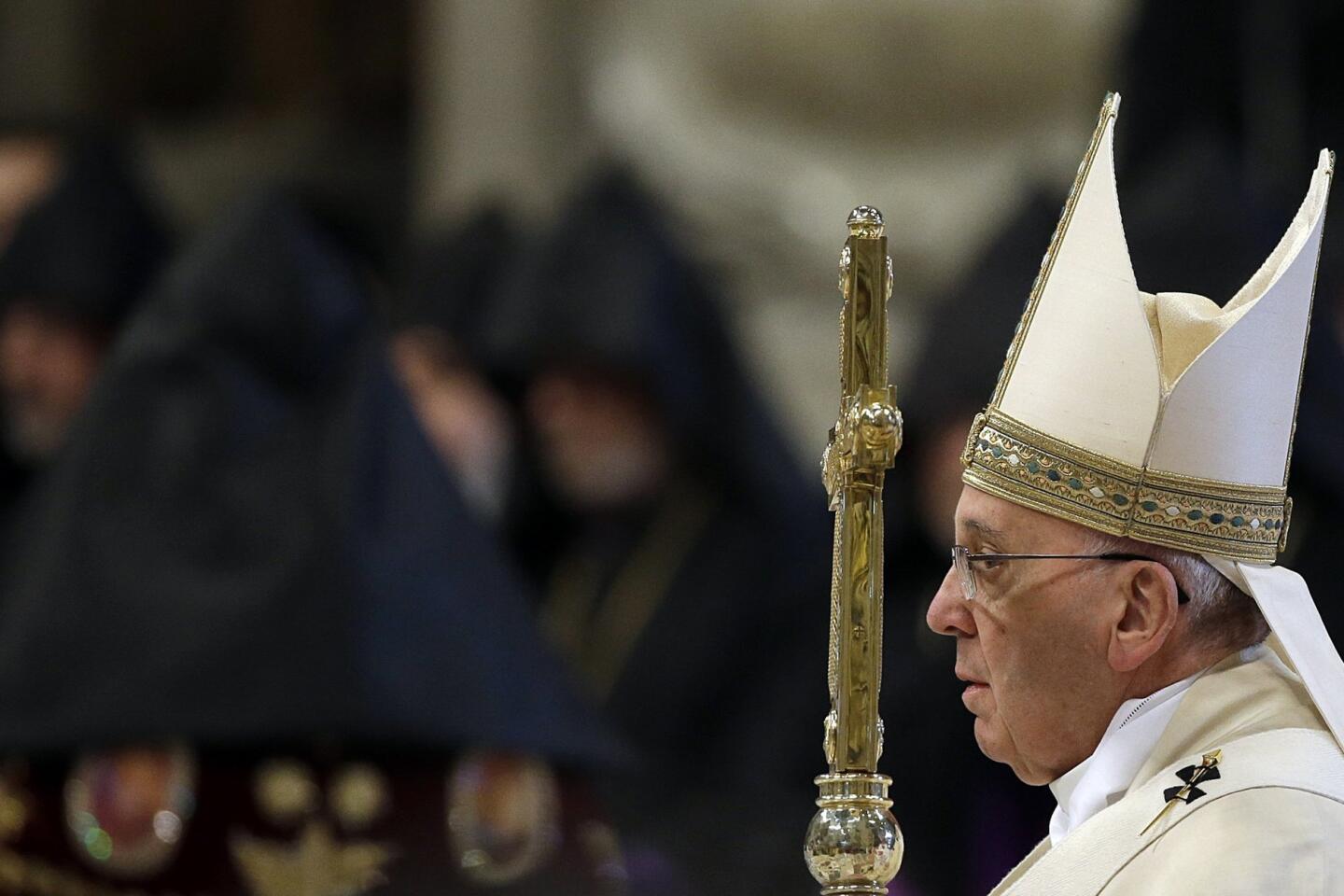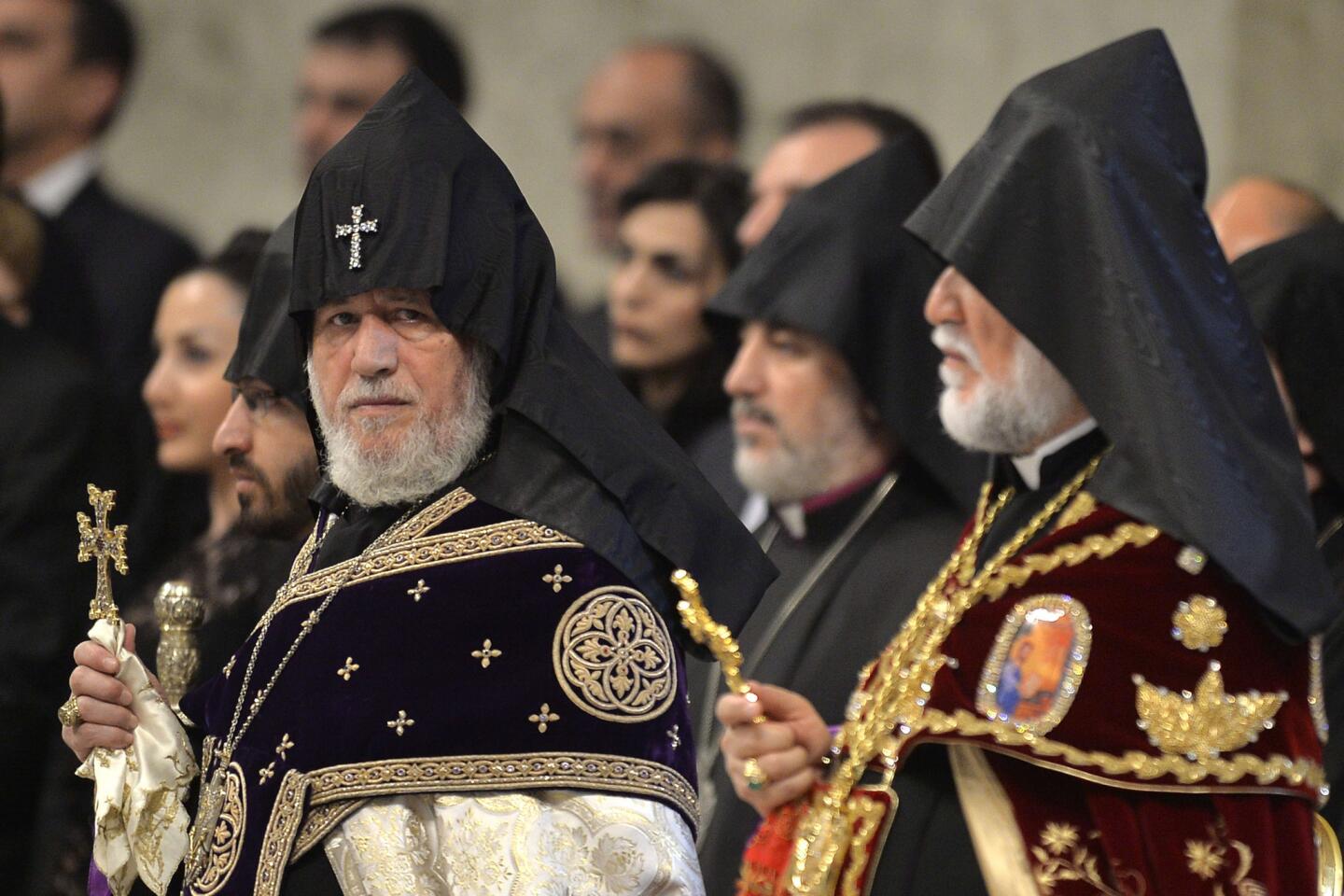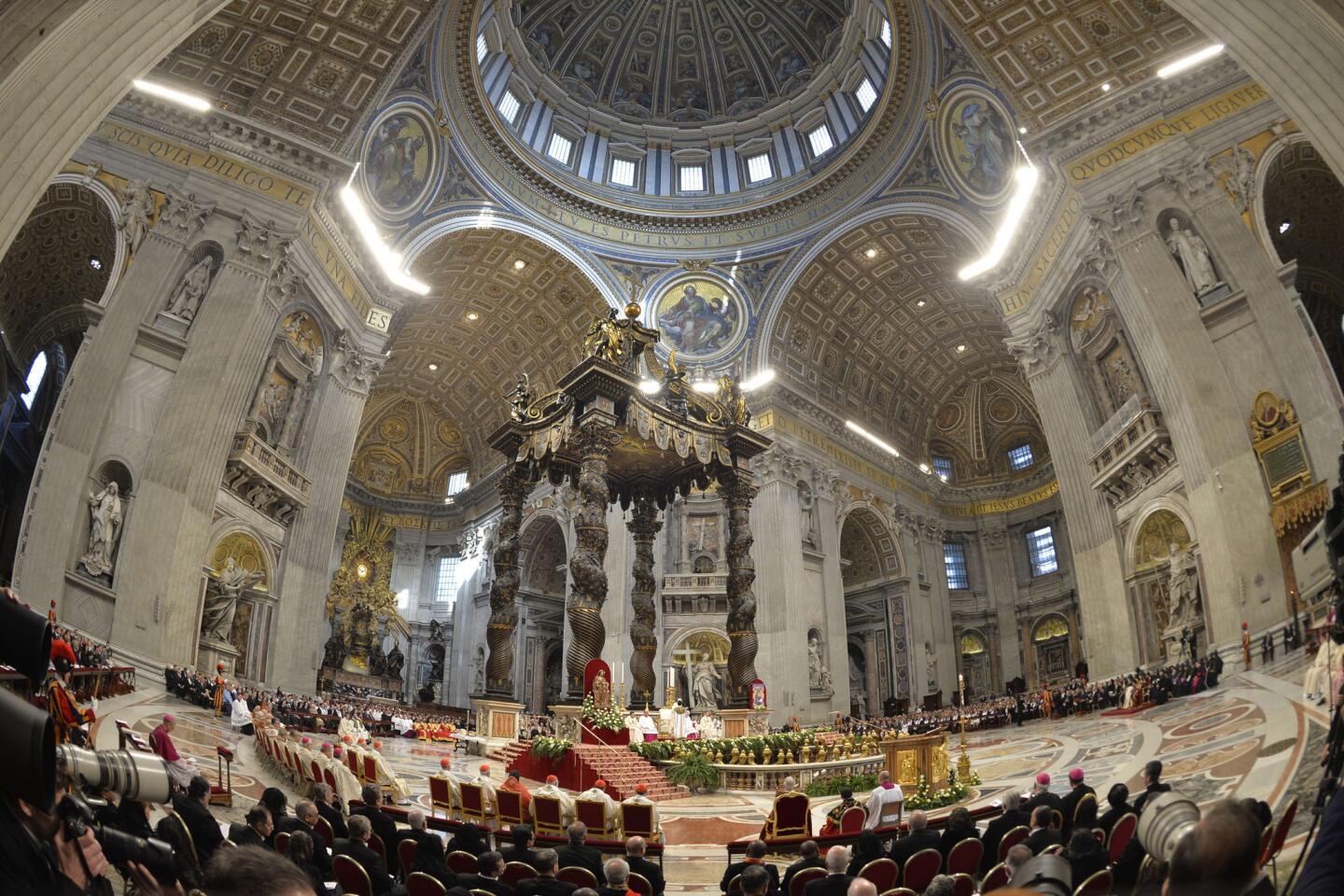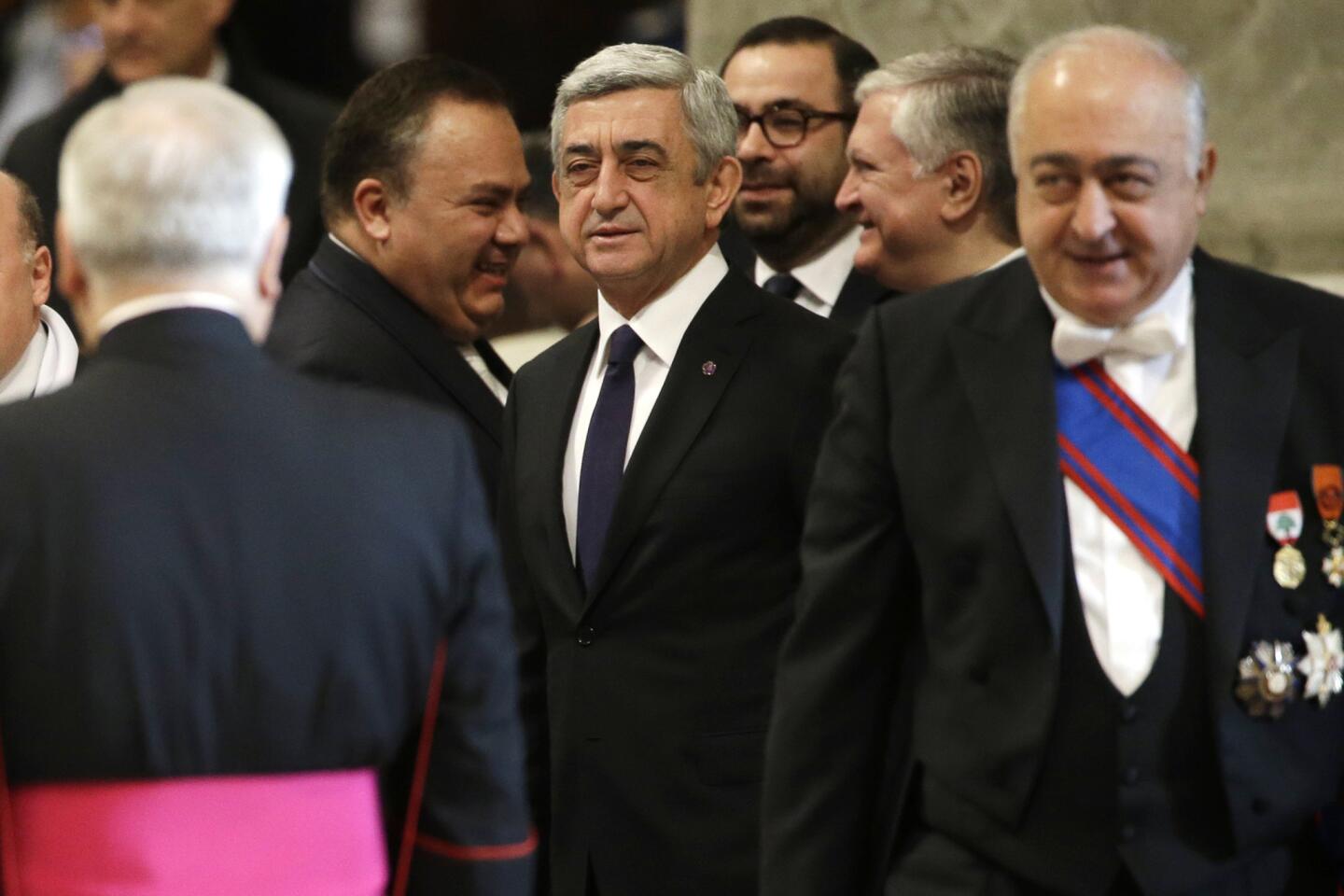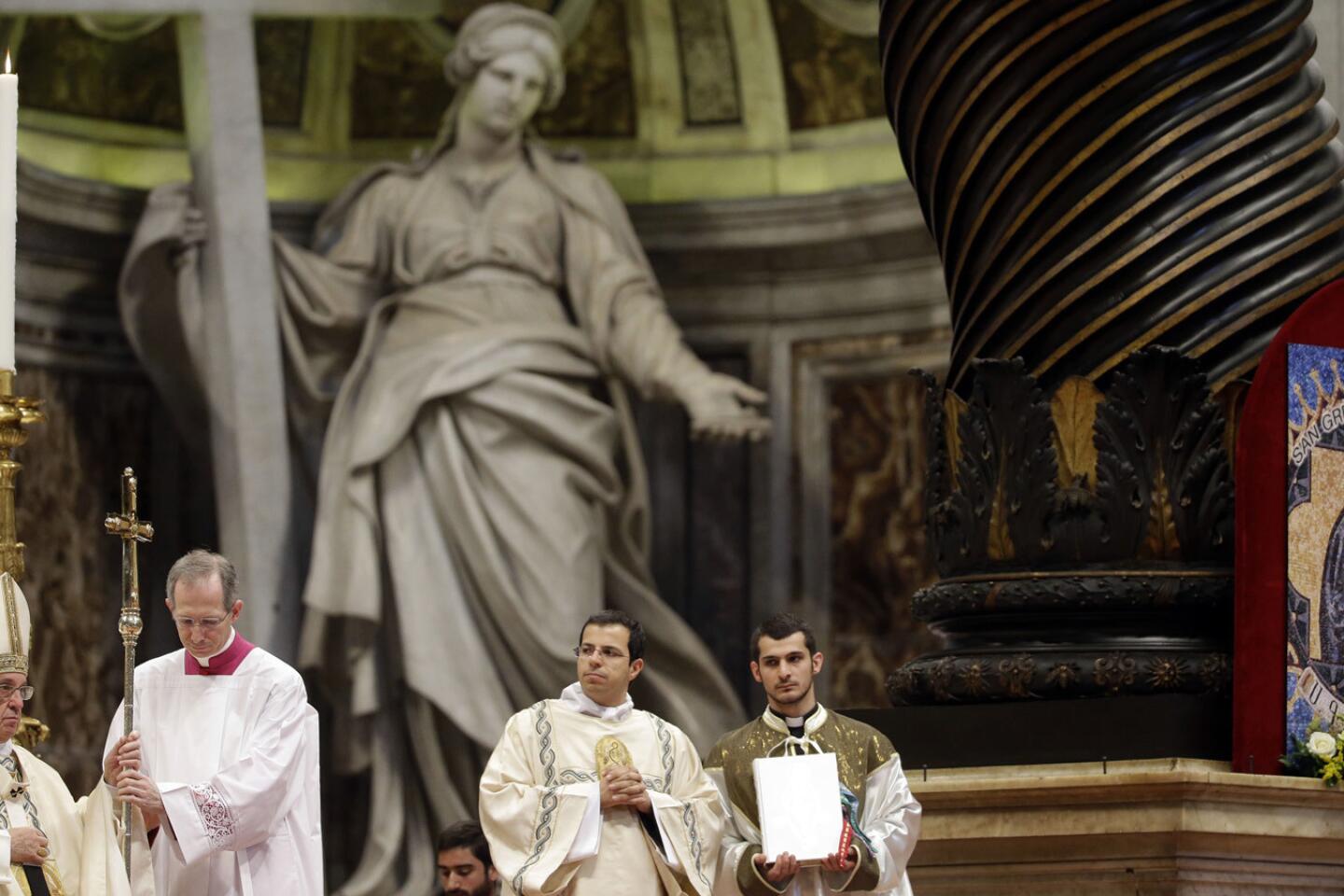Pope Francis’ Armenian genocide remarks prompt strong response
- Share via
Reporting from Rome — It wasn’t so much what he said as how he said it.
When Pope Francis used the term “genocide” on Sunday to describe the massacre of Armenians by Ottoman Turks 100 years ago, he was not breaking new ground. Pope John Paul II had written the same in 2001, and Francis had made similar references before.
But the timing and setting of the pope’s remarks — a Mass at St. Peter’s Basilica marking the centenary of the killings, with top Armenian religious and political leaders in attendance — drew a strong international response. Armenians worldwide expressed deep gratitude to Francis, while Turkey reacted in anger.
“It’s very, very exciting that the pope has the strength to say it,” said Seta Haig, a mental health therapist who attended services Sunday at St. Gregory Armenian Catholic Church in Glendale. “He is fearless. He has guts.”
More than 200,000 people of Armenian descent live in Los Angeles County, with a large concentration in Glendale, according to U.S. Census data.
The Turkish government responded to the pope’s comments by recalling its ambassador to the Vatican, and summoned the Vatican’s ambassador in Ankara to express its “great disappointment and sadness.”
Turkey claims that just half a million Armenians died in fighting when they rose up against their Ottoman rulers during World War I, and denies that their deaths constitute an act of genocide.
That position conflicts with the views of most historians of the period, who agree that as many as 1.5 million Armenians were victims of genocide at the hands of the Turks.
Speaking at the Mass, Francis defined the slaughter as “the first genocide of the 20th century,” quoting the statement made by John Paul II.
“The remaining two were perpetrated by Nazism and Stalinism,” Francis said. “And more recently there have been other mass killings, like those in Cambodia, Rwanda, Burundi and Bosnia.”
Francis said it was “necessary, and indeed a duty,” to remember the Armenians killed, “for whenever memory fades, it means that evil allows wounds to fester. Concealing or denying evil is like allowing a wound to keep bleeding without bandaging it!”
Among those listening at St. Peter’s were Armenian President Serzh Sargsyan and the leadership of the Armenian Apostolic Church, including Karekin II and Aram I, the two Catholicoi at the top of the church’s hierarchy.
Sargsyan praised Francis for “calling things by their names.”
“The words of the leader of a church with 1 billion followers cannot but have a strong impact,” he said in an interview with the Associated Press.
Francis’ comments were similarly hailed in Southern California’s large Armenian diaspora community, which has lobbied for years for official recognition of the genocide.
“As far as the Armenian American community is concerned, the pope has taken a courageous stand despite the threats from the Republic of Turkey,” Glendale Mayor Zareh Sinanyan said.
Sinanyan said Turkey’s denial of the genocide and the United States’ refusal to acknowledge it have kept Armenians from moving on from the killings.
“It’s like a bleeding wound that just won’t go away,” he said. “There’s no closure, there’s no healing.”
Rep. Adam B. Schiff (D-Burbank), who is the lead sponsor of the proposed Armenian Genocide Truth and Justice Resolution, also praised the pope and called again for action by the United States.
“Pope Francis has proven himself a remarkable figure in every way, and his recognition today of the Armenian genocide was another courageous milestone in his papacy,” he said in a statement issued by his office. “I hope that the pope’s words will inspire our president and Congress to demonstrate a like commitment to speaking the truth about the Armenian genocide and to renounce Turkey’s campaign of concealment and denial.”
A number of countries have issued statements over the years condemning Turkey’s actions as genocide. Although President Obama, before his 2008 election, referred several times to the deaths as genocide, he has not done so as president, maintaining his predecessors’ reluctance to alienate Turkey, a highly valued ally in the Middle East.
Turkey said Francis’ comments “contradicted his message of peace, reconciliation and dialogue” made during his visit to the country in November.
“The pope’s statement, which is far from the legal and historical reality, cannot be accepted,” Turkish Foreign Minister Mevlut Cavusoglu tweeted on Sunday.
“Religious authorities are not the places to incite resentment and hatred with baseless allegations,” he added.
Francis now risks losing Turkey’s support as he seeks to defend Christian communities being persecuted by Islamic State in Syria and Iraq. Many Christians have sought refuge in Turkey, a predominantly Muslim country, as they have fled the Islamist militants.
Describing those communities Sunday, Francis underscored the “muffled and forgotten cry of so many of our defenseless brothers and sisters who, on account of their faith in Christ or their ethnic origin, are publicly and ruthlessly put to death — decapitated, crucified, burned alive — or forced to leave their homeland.”
In a speech at St. Peter’s before the Mass, the Armenian prelate Karekin II used the word “genocide” 13 times.
“With a deliberate plan, with horrific atrocities, one and a half million Armenians were slaughtered,” he said. “Our ancient people were uprooted from their cherished cradle of life — their historic homeland — and scattered over different countries. Our centuries-old Christian legacy heritage was ruined, obliterated and seized.”
Kington is a special correspondent. Times staff writers Anh Do, Soumya Karlamangla and Ruben Vives in Los Angeles contributed to this report.
More to Read
Sign up for Essential California
The most important California stories and recommendations in your inbox every morning.
You may occasionally receive promotional content from the Los Angeles Times.
